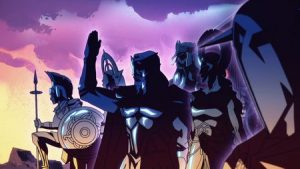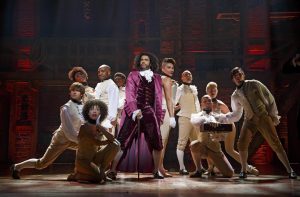As someone who has been an avid fan of Greek mythology ever since I read Edith Hamilton’s Mythology as a kid, I was admittedly a little wary of starting Netflix’s newest anime series, Blood Of Zeus: the series tells a wholly new story unlike anything from the myths themselves, but embellishes it with all the trappings we know from the Greek legendarium. I’m not much of a stickler for accuracy when it comes to adapting the ancient myths, but I find it…vaguely frustrating whenever adaptations mess up and try to Hollywood-ize a mythology that is already so incredibly exciting and engaging that it has survived in the public consciousness for millennia. Blood Of Zeus is at least trying to create something more in line with the tone of the ancient myths, although it too falters more often than it succeeds. In the end, I regard the series as fun, deeply flawed entertainment that just takes a little too long to get to the really good stuff…but once it gets there, dangerously close to the season finale, it gets so good, so briefly, that you’ll be hooked and probably left hoping for a second season.

The first few episodes of the series, unfortunately, are so slow-paced that you might be tempted to opt out long before you reach that point – and I wouldn’t blame you. There are extensive interludes between the action and drama that are filled to the brim with exposition and meandering flashback sequences. We have to flesh out our hero’s backstory, you see, and then we have to do the same for our main villain. It’s only after Zeus (Jason O’Mara) personally enters the fray and our protagonist Heron (Derek Phillips) finally assembles his rag-tag team of heroes – somewhat spontaneously, to be honest – that things start to heat up, with a visit to the heavenly haunts of Mount Olympus, a mystical encounter with the three Fates, and a journey through a section of the Labyrinth all packed into about a single genuinely thrilling hour.
What these three events have in common is their roots in ancient Greek myth – and Blood Of Zeus is at its best when it’s putting a cool, dark twist on the Greek legends and not trying to stray too far from the extremely solid source material. Whenever it begins to move in any other direction or tries to build up its own deep lore, it feels jarringly dissimilar to the rest of the series and a bit generic. Heron, the illegitimate son of Zeus, is only one of several major characters who don’t really have much in the way of a personality or motivation (partly due to all of the interesting and exciting bits of his backstory only pertaining to his infancy, leaving adult Heron with…not a whole lot). Alexia (Jessica Henwick), the series’ female lead and an Amazon warrior, has a lot of screentime but seems the most disconnected from the other characters and even the story itself: she’ll run past every now and again on the trail of some demon, but the show never really tries to do anything with her. As is all too common these days, the comic relief characters are the only ones that feel developed and likable – smuggler Evios (Chris Diamantopoulos) and wrestler Kofi (Adetokumboh M’Cormack) have fun, easygoing banter and maybe a spark of chemistry? Perhaps I was just reading too much into their relationship. You’ll have to forgive me, though; Greek mythology is among the gayest in the world, and I was a little confused about why that wasn’t being accurately represented onscreen (we’ll talk about the actual bisexual representation in the show soon, don’t worry).

The Gods are more fleshed out than their human co-stars, luckily. Zeus’s dynamic with his wife Hera (Claudia Christian) is lifted almost straight from the myths of old, though the portrayal of Hera and the demonstration of her famous anger is one of the series’ greatest (yet least surprising) missteps. Unfortunately, men have almost always written Hera the same exact way, from ancient Greek times to today: she’s the unreasonable, unhinged mad woman who relentlessly terrifies and tortures her husband’s many lovers. Blood Of Zeus makes no attempt to shake up the narrative – in fact, it doubles down on this centuries-old stereotype and takes Hera to the next level, elevating her to a mentally unstable tyrant whose ultimate goal is to tear down Olympus stone by stone. Meanwhile Zeus is portrayed as loving, sympathetic and caring; but only towards a single mortal woman. Leaving aside the fact that mythological Zeus never had fewer than a hundred mistresses simultaneously and the thought of him settling on just one is laughable from that standpoint, it’s honestly just cringeworthy to see how the script puts Zeus on a pedestal while having him gaslight his wife. At a time when feminist retellings of Greeks myths (like Madeline Miller’s Circe) have never been more popular, the decision to write Hera this way betrays a lack of imagination from the writers, but also a staggering amount of ignorance to the fact that the “mad woman” trope is harmful and degrading, whether its being used to give Jon Snow a reason to turn on Daenerys Targaryen, or for the X-Men to turn on Jean Grey, or for Zeus to turn on Hera. If you’re going to rewrite the myth to make Zeus some high and mighty good guy with a heart of gold, you can also write a version where Hera is a sympathetic character for once, or at least not being vilified for reacting to her husband’s misdeeds.
The one good thing that Blood Of Zeus does with Hera’s character is make her physically powerful. In the myths, such as in The Iliad, her influence is mostly felt behind the scenes: unlike Athena or Artemis, she hardly ever goes down to the battlefield personally. In this series, however, she can levitate both herself and whatever else happens to be in the vicinity – usually large, sharp objects or boulders. She also has an entire army of crow minions: a strange choice, considering that crows aren’t sacred to Hera, but probably a bit more practical than the alternative – an army of peacocks. All these things help to make her extremely impressive and formidable during action scenes. It’s just a shame that the script forces her to use her powers for evil the whole time.
Speaking of powers, let’s talk about Hermes (Matthew Mercer), who somehow stands out from the crowded ensemble cast as my favorite of the Greek Gods. Despite being maybe a little bit overexposed in the myths themselves – he shows up in more myths than any of the other Olympians – these days he’s mostly remembered for his iconic caduceus, if he’s remembered at all. Blood Of Zeus presents him as a pretty awesome, rainbow-cloaked speedster who also gets to regularly fulfil his duties as the psychopompos: essentially the usher of the dead, who leads souls to the Underworld, including most of the casualties inflicted by the brutal warfare throughout the series. It’s a great way to highlight an overlooked aspect of his character, and makes me wish the same courtesy had been extended to literally any other Olympian.
Out of the remaining Gods, Apollo (Adam Croasdell) is the only other one with a good deal of screentime and his own subplot. He’s also the only identifiably LGBTQ+ character in the entire series, or at least that’s the implication we’re supposed to take away from a single scene of him sleeping in the embrace of both a man and a woman. Considering that we’re dealing with the Greek gods here, I found this kind of blink-and-you’ll-miss-it representation to be slightly disappointing. Zeus, Poseidon, and Dionysus all had at least one male lover each. Hercules had male lovers (something Disney definitely left out of their movie). As much as I unabashedly adore Apollo, why is he the only LGBTQ+ representation we got from Blood Of Zeus? I don’t mind changing the myths, but changing them to be less gay? WHY?

You might be wondering why I haven’t mentioned any of the other goddesses besides Hera yet, and that’s because…they’re not there. The series almost entirely erases the great women of Greek mythology: the Amazons are only represented by a single character, whose ultimate purpose in the story turns out to be shockingly minor; Athena, the goddess of warfare herself, is reduced to a background character with no dialogue, while Ares fills her role as war god for only the umpteenth time in Hollywood history; Aphrodite, Artemis, and Demeter are extras only used to fill out crowd scenes. And if that wasn’t enough, the show has a serious issue when it comes to fridging the few female characters it does have; murdering them to motivate the male characters.
Blood Of Zeus is still fun and largely enjoyable for its final three episodes, or otherwise this would just be a rant review. The animation style is beautiful, although there’s nowhere near enough character differentiation for a cast this large, and the action scenes are visually stunning: every major character has some kind of specific ability that enables them to keep up with all the gods and monsters, whether that’s agility or wits or super strength. The fights are often brutally violent, and the series makes sure never to give anyone too much plot armor – even the Gods can be wounded, mutilated or killed, which helps to make every battle suspenseful: even if you know a character won’t necessarily die, there’s nothing to say they won’t lose a limb. Especially because the villains aren’t all bark and no bite: both Hera and the main antagonist Seraphim (Elias Toufexis) kill people, frequently. Seraphim, a merciless demon war lord with a cool set of facial scars, is in fact only interesting whenever he’s killing people – because whenever he’s not, he’s usually brooding instead, and that’s always a recipe for Boring Villain Syndrome™. He’s an original character, in case you hadn’t guessed. He also walks or flies around accompanied by a whole bunch of original characters: a scurrying, uniform demon horde that might as well just be the wights of Game Of Thrones (a series with which Blood Of Zeus has too many similarities for its own good).
The funny thing is that, for the most part, my problems with Blood Of Zeus don’t really arise from any sense of indignation or outrage about all the changes made to the myths: in a mythology that evolved as rapidly as that of the Greeks, there’s not really any set “canon” to adhere to anyway. I love retellings, especially when they re-examine a well-known story from a completely new perspective or from a different angle – for instance, Mary Renault did this incredibly well in her books about the hero Theseus. So mostly I’m just amused and confused that any scriptwriter could look at a mythology as rich and utterly bizarre as this one, and decide that what it really needs is a whole bunch of new, made-up stuff like zombie demons. When that new, made-up stuff is entertaining in its own right, fine. But the writing for Blood Of Zeus simply isn’t strong enough to make any of the new stuff work, and so it’s the ancient Greeks who have the last laugh.

All that being said, the series is still a lot of fun! Seeing even small bits and pieces of the myths brought to life is an experience that leaves a mark, and makes me want more: yes, even more of this particular show. And let me tell you in as non-spoilery terms as possible that the finale of Blood Of Zeus lay good, strong groundwork for another season – one that honestly sounds a lot more interesting than the first. But even if it isn’t, even if this show simply is not my cup of tea, I hope that it will at least pave the way for other dark adaptations of Greek mythology that I (and anybody else wounded to the core by this show’s lack of Athena) might enjoy. There’s a lot more to the Greek mythos than just Hercules, and I hope Blood Of Zeus – not to mention the upcoming Percy Jackson series – gets that message through to Hollywood once and for all.
Series Rating: 5/10









